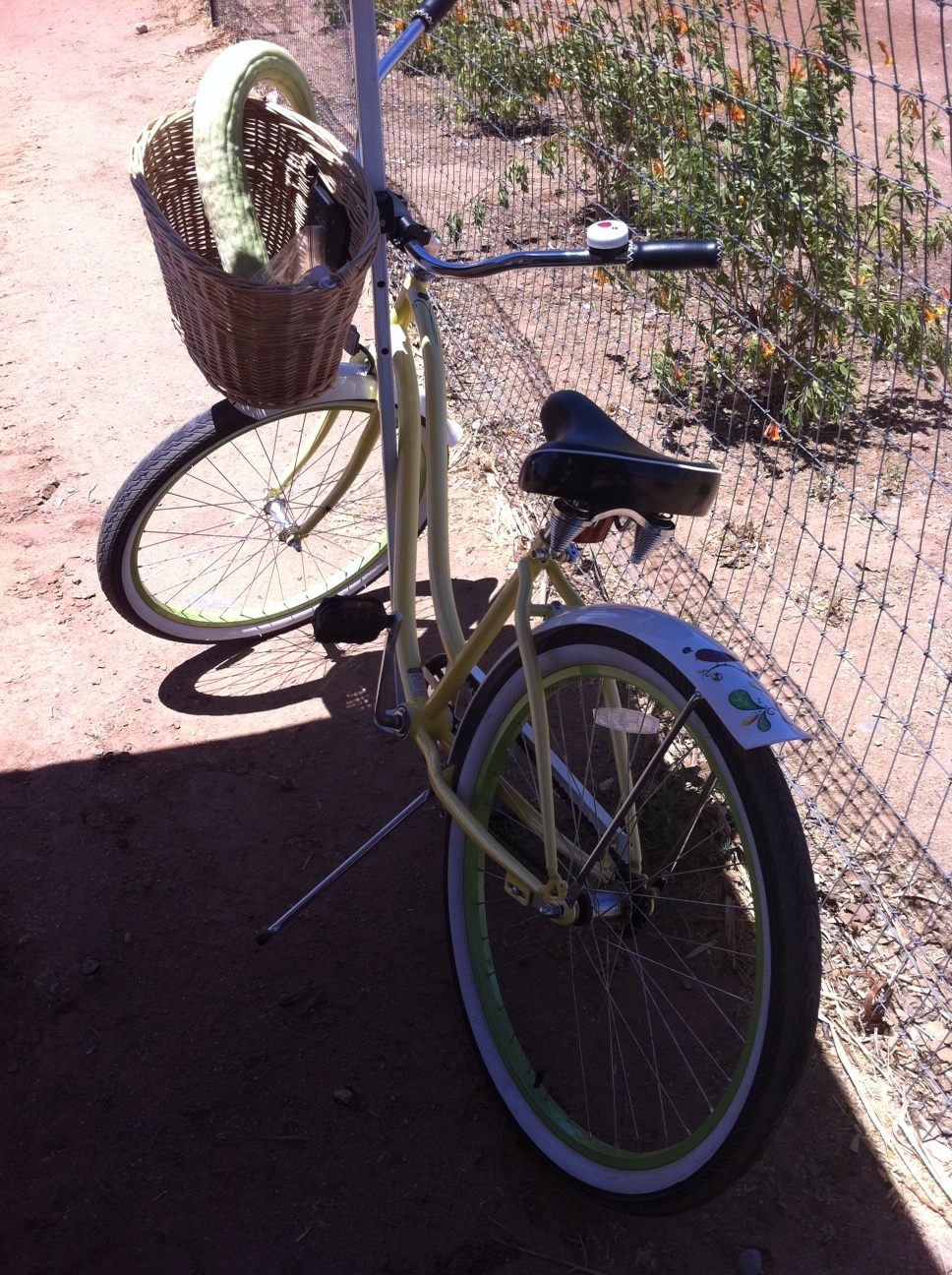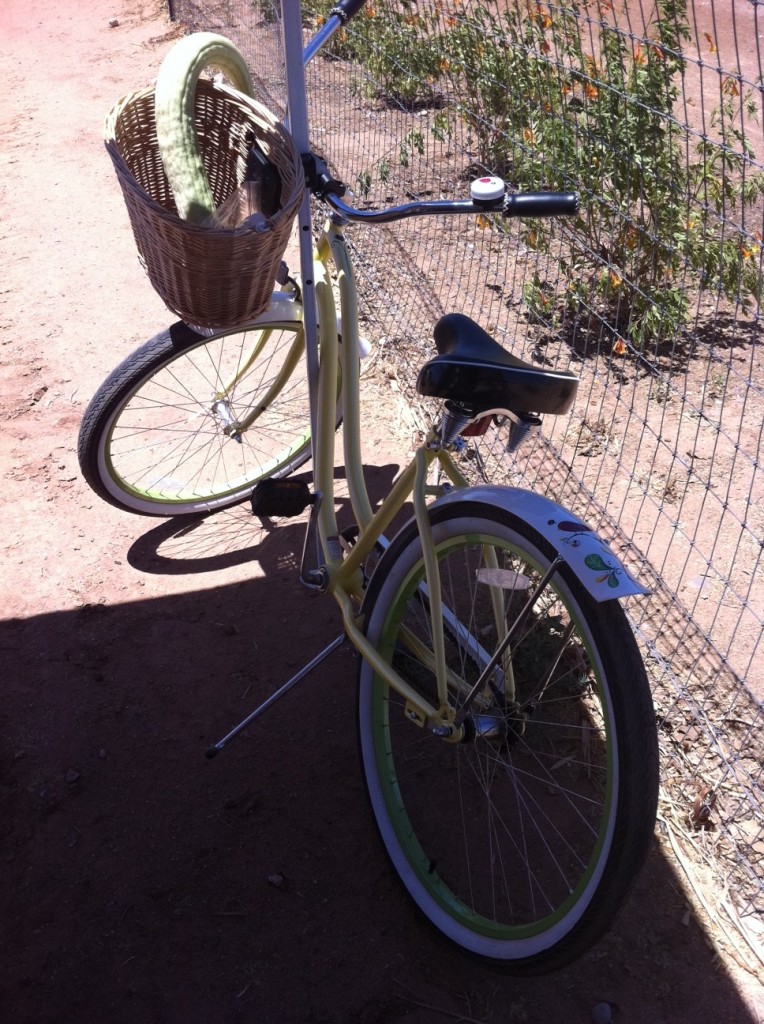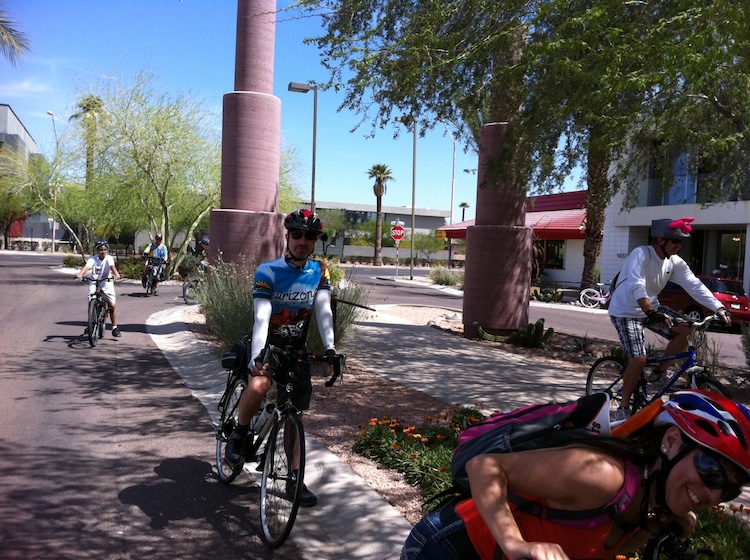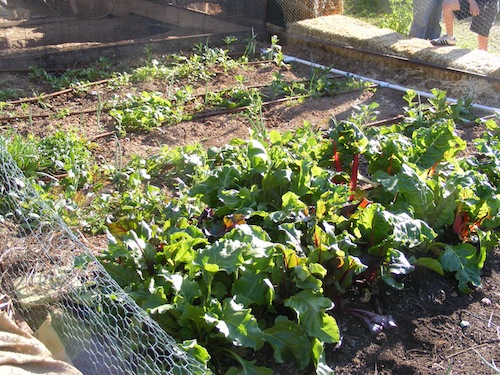Today’s post is part II of my interview with Phoenix Mayor candidate Wes Gullett. If you missed part I, catch it here.
Note: If you’re not registered to vote yet, please do so now by clicking here! Remember that if you’re not registered to vote by August 1, you will NOT be able to vote in the mayoral election on August 30. If you are already registered, know that your voting place is not the same. Click here to see where the new voting centers will be.
A bike showcasing a squash at Agritopia. Photo by the author.
Blooming Rock: Since we’ve been talking about transportation, I’m a biker and I bike all around the city. As mayor what would you do to make biking safer and make it more desirable for people to walk in the city?
Wes Gullett: We have to have a much stronger commitment to bike lanes.
With planning and making the Light Rail a potential hub, we can make sure that the stations are bike-able, then we can create more opportunity, less car traffic and make sure that we have a bike plan for each one of those Station Areas so that we have a spoke of bikeable areas that then expand the opportunities.
In terms of walkability, we need shade. And we have to invest in shade.
One of the things we have to take advantage of in our bond programs and in other things are looking at shade opportunities and investing in shade like it’s an infrastructure, like sewer and water. Because it is. And that creates that walkability.
We did a lot of work in Downtown on the Urban Form (Code). And when we did the Urban Form, there’s a lot of shade structures, there’s a lot of pocket parks, enhanced walkability in Downtown which are really important as elements of that planning process.
The Cancer Survivor’s pocket park on McDowell and 1st Street. Photo by the author.
The challenge is who’s going to pay for it? And right now we don’t have people who are willing to build and then pay for creating the amenities we need on 1st Street, for example.
I kept asking, who’s going to pay for this? And the answer was always the private sector. We’re going to give them all these enhancements, and that’s going to help.
The private sector doesn’t have the resources to invest. So it comes back to the economics. How do we create investment dollars, how do we attract investment dollars to Phoenix?
One of the ways to do it is (increased shade and walkability in Downtown).
But it goes back to being able to pay for it. Yes we have to do it.
We need to make sure we have shade, that we have walkability, that we have pocket parks and all this stuff Downtown. But how are we going to pay for it?
So we’ve got to have a commitment to putting dollars with those projects. My belief is that we invest $3 billion a year, put $3 billion a year in banks, we need to have tangible (requirements) when we make a contract with a bank, when we put our money in a bank.
We need to have tangible things that they (the banks) give back to the community. And they need to create investment opportunities for Phoenix.
And those investment opportunities then create the money that’s available so that small businesses can expand and grow in Downtown. And if we have that, and we have this economy growing, the idea was that these big high-rises were going to pay for everything.
The reality is that we’re not necessarily going to have these big high-rises. So then we need to re-focus our bond programs to be doing infrastructure like shade and walkability and creating those things. We need to take some of that bond money in the future to work on that part of the process.
Blooming Rock: Speaking about shade, there’s that Tree and Shade Masterplan that the City came up with. How important do you think it is to have a healthy urban forest to the future of our city and what can we do about it?
Wes Gullett: I plant a tree or two every year on my property. We have to have a commitment to reducing the heat island through the appropriate (measures).
I’m a big gardener, I garden. I was in my garden this morning.
We don’t have a commitment to utilizing the resources that we have, we have all kinds of land. We could turn that into all kinds of (productive use).
The trouble is that we put trees in where we’re worried about cutting them down if there’s a development opportunity. So we have to plant the trees in the areas that we know are not going to be developed.
Then it always comes down to the money. Can we afford it? Do we need it? Yes? Do we need to have a commitment to it? Yes. How do we prioritize it with the money?
If we don’t have savings, and get the economy going again, then we’re not going to have the resources to do this.
But we also have to partner with organizations that are like-minded and have public-private partnerships to develop the things that we think are important. And there’s no doubt, I live on North Central Avenue. I walk on the bridal path everyday. Why do people walk on the bridal path? Because it’s shady.
Blooming Rock: Would you go so far as to maybe add more requirements for businesses to create shade?
Wes Gullett: No. I’d give them incentives. The more rules you put on them, the more they’ll just go some place else.
Business is going to go with the best place where they’ll make the most money. They’re not going to go to a place that has a bunch of rules, restrictions and requirements.
So if we want Downtown to be empty, lets put a whole bunch of rules on it.
But if we want Downtown to grow, then the City has to say that this is a priority to us. If we put it in the bond program and people don’t vote for it then we know that they haven’t gotten that idea.
But we also have to focus on the idea that there’s a variety of vibrancy throughout the city. That we’re committed to shade, we’re committed to high standards in Maryvale and South Phoenix as well as Downtown.
We have to realize that with the private sector, we can put all kinds of restrictions on them if we’re changing their zoing and we’re giving them something of huge value.
But in Downtown, we’ve already given away a lot of the value. We don’t have a lot to bargain with. If we’ve got 250 feet on a lot Downtown and we’re going to let them build to the sidewalk, great. But we just don’t have a lot of bargaining power.
Blooming Rock: How do we get there though? What’s the first step?
Wes Gullett: We have to say it’s a priority and invest ourselves with the money.
Blooming Rock: So the City itself needs to be a leader in terms of planting trees and shade and things like that?
Wes Gullett: Yep.
Blooming Rock: But like you’re saying, it’s hard to do without the money.
Wes Gullett: Well that’s why we’ve got to cut our costs and come up with the money. And I’m the only candidate that knows where I can get the money. I know that I can get $20 million as a start. Then ok, what’s the priority for that $20 million?
Blooming Rock: So do you think trees and shade are a priority?
Wes Gullett: I think that after-school programs are a priority. I think that new technology for the police department so they can be more efficient is a priority. I think growing the economy is a priority.
And I think that if we want to grow the economy, we’ve got to be willing to commit to making our city more walkable and doing these other things. So yes, it’s a priority.
Is it the top priority? No, it’s not the top priority. The top priority is getting the economy going again.
And if we can make the argument that shade’s going to help us do that, then we need to up the shade quotient. But we can take advantage through partnerships like urban gardening and release the energy of the city. We stand in the way so often it’s ridiculous. We only have a 5-day supply of food in Phoenix.
Blooming Rock: What do you mean?
Wes Gullett: If there was a crisis and we were cut off from the world, in 5 days we would be out of food.
Blooming Rock: Oh I see, because we don’t grow anything here.
Wes Gullett: Right.
Blooming Rock: It’s too bad because we have all these irrigated lots we could grow a ton of stuff on.
The Green House Farm, an urban farm on Osborn and 24th Street. Photo by the author.
Wes Gullett: We used to be a garden.
Blooming Rock: True. So, Mayor Gordon has put forth the Green Phoenix Plan. Would you, as mayor, plan to continue this? And what are some of the specific things you would do to help Phoenix become one of the greenest cities in the country? And is this even something you’re interested in doing?
Wes Gullett: We have to be sustainable. We have to have a commitment to that and the City needs to lead.
I don’t think we can put a whole bunch of requirements on businesses right now because they’ll go some place where they don’t have those requirements. They’ll go to Peoria, or Chandler or Surprise or Austin or places that don’t have requirements.
We’ve got to work in partnership with others to create that sustainability. But the City should take every opportunity to do it.
Mrs. Neely said that LEED certification was not something that she cared about because it was just a costly and unnecessary.
But we need to make sure that the City is building up to those standards, even if we’re not going after that certification.
And maybe we have our own internal certification. But we’ve got to make sure that we get the economy going again.
Here’s what they didn’t do for the last ten years. They didn’t ask.
When people came, they didn’t say we want you to do this (build to green standards). And we’ve got to do that.
And we have to push and bargain until they say no, we’re going some place else.
But how do we know? We haven’t had a strategic plan since 1991. We don’t have any idea of what our assets are or what our liabilities are. The Discovery Triangle has a ten times better database than the City of Phoenix does. We don’t have any idea what we’re talking about.
Blooming Rock: I want to ask you a very specific question about Downtown, something my readers care about. What is your stance on the demolition of the Ramada and the subsequent parking lot that was put in?
Wes Gullett: Oh the one that they painted green?
Blooming Rock: Yea.
Wes Gullett: We have a lot of parking lots Downtown. We have plenty of surface parking lots.
The idea that the Law School is going to come to that spot is a great idea. But before we tear stuff down, maybe we should make sure that we know what we’re tearing it down for.
Because we have a lot of property that we already own and when something’s torn down, you can’t get it back.
We’ve got to be really careful about that. But at the same time, we also have to be careful about how we’re spending money and what the return on that money is and is it more cost-effective?
I’m sure the City would say that it was much more cost-effective to tear that building down. But it’s got to be significantly a better deal because you can’t get buildings back.
Here’s my complaint about the City of Phoenix. And I saw this on the Planning and Zoning Commission. And I did something about it.
We give away too much. We give away height, we give away density to people who have am interesting-looking plan.
We don’t hold their feet to the fire to build it. The only jobs we’re creating through that are jobs for zoning lawyers.
And here’s what I did about it. What I did about it is say, let’s put time stipulations on it.
If you’re not going to build in three years, you’re going to lose your zoning. We did that.
When I became chairman, I said we put a lot of time stipulations on zoning, what’s going on with those? They said, well, we haven’t really looked at that. Well let’s look at it!
We had time stipulations dating back to 1992 that nothing had happened about. We have to be responsible adults, we have to hold people accountable.
We have to hold the private sector accountable, we have to hold the City accountable. And what do we have for all these giveaways? Empty lots!
Blooming Rock: Yea! True!
Wes Gullett: And we can’t do anything about it because now we’ve given it all away. And now we’re waiting for Superman. We’re waiting for Superman to build 250 feet and it’s not going to happen.
And it’s not my fault. It’s their fault – my three opponent’s fault for not holding people accountable. And giving away to the developers too often.
And guess what? Developers aren’t bad people. They make great things.
We just have to work in partnership with them and say ok, we’re giving you this. And you’re giving us progress. If you’re not giving us progress, we’re not giving you what you want. Because now you have the ability to just flip that land when the market comes back. And we’ve been waiting for 50 years on North Central Avenue.
Blooming Rock: That’s a great point. I really like the time limits, that’s a great idea. What is your stance on the reversible lanes? Should we keep them, lose them or what?
Wes Gullett: I think that there’s a middle ground. I think we need to look at 7th Avenue and continue to study it. I think there were some things that weren’t allowed in the study (that was done) that could make sense.
Like instead of having two lanes going south and three lanes going north, that we could have three lanes going south, and two lanes going north. That wasn’t looked at at all. If we did that on 7th Avenue, I think we could eliminate the suicide lane.
Blooming Rock: Oh so get an additional lane going south permanently on 7th Avenue? But what about then going home?
Wes Gullett: Going home? It would slow people up coming out of Downtown. But it would be better for business on 7th Avenue. (He laughs.)
Blooming Rock: That’s an interesting plan.
Wes Gullett: And typical City, “oh I can’t talk about that”. Seventh Avenue we’ve got to keep working on, we’ve got to make 7th Avenue better. Seventh Street, we need to keep the reversible lanes on 7th Street. It moves too much traffic too effectively.
Blooming Rock: But you think there’s a possibility to make some major changes on 7th Avenue?
Wes Gullett: Yes.
Blooming Rock: This is a question I ask every candidate. People in our city aren’t very engaged in the public process. As Mayor, or even as a candidate, how do you pursue that? How do you get people to be more engaged? More interested in city politics so that they’re better voters and then once you’re voted in, they can be better citizens?
Wes Gullett: My proposal is to move the election date to the even-numbered years. And I would take a year out of my term to do it.
What always happens is that the current office holder looks like they’re trying to extend their term. I’m willing to take a year off of my term to move the mayor’s election to 2014 and to have it in conjunction with the Governor’s race.
And that would double or triple turnout. If there are only two candidates, the election for mayor ought to be in November. If there are multiple candidates, there should be a Primary in August and then the runoff in November.
Blooming Rock: Which is what people are used to.
Wes Gullett: Right. And that way you have significanty more people engaged in the process to begin with. So that’s a specific idea.
Generally I think that we’ve got to get a long list of people and we’ve got to recruit people again to get on boards and commissions. And then we need to have a leadership academy or work with leadership academies throughout the state to provide actual leadership training for our boards and commissions people so that they’re willing to take the next step.
I was vice-chairman of the Planning Commission, then I was chairman. I could run a good meeting. People were anxious about stepping into those two positions because they were nervous about being able to run a meeting.
What we need to do is offer them training so that they can actually learn how to run a meeting and what the requirements are. And not just vilify them like Peggy Neely has done. Peggy Neely vilified the Board of Adjustments this past week and it’s outrageous.
She said that because somebody declared a conflict, that if you’re going to be on a board or commission, you need to file a financial disclosure form. That’s not going to increase citizen participation. That’s going to chase citizen participation away!
What we need to do is make sure that those people who’re on those boards and commissions understand the rules and that they can declare those conflicts early on. But not make it onerous and an invasion of everybody’s privacy. These are volunteers, citizen activists.























What a great service you have provided. Your two part series was by far the most comprehensive interview I have done during the campaign. Thanks for sharing my thoughts with your readers.
Hi Wes, thanks for your kind words! And thanks for your time in giving the interview. I’m glad you feel heard and were able to give my readers an in-depth look at your views.
He has some good ideas and asks some of the right questions, but all told he misses the mark. Wanting to keep the reversable lane on 7th st, not taking a firm enough position on the Ramada lot, etc.
He asks a lot of “where is the money going to come from?” sort of questions but fails to provide any answers. Wouldnt his job as Mayor be to propose and impliment solutions, not just point out issues we’re all aware of?
Plus the “i’m the only candidate that knows where to get the money, I can get $20M” is a bit odd & borderline creepy. Does he want to share this plan with everyone or does he just know a guy who owes him some cash? If he has a plan to raise that kind of money he ought to share it as it may benefit the city whether or not he’s elected, as is this & his Pikes Place @ Target idea come across like he just wants to build monuments to his own legacy & ego.
I re-read the post after reading the “I can get $20M” comment, figuring I must have missed something.
Aside from saying things are important, then saying how we can’t afford those things(hint: they’re not really that important if you can’t find a way to pay for a few street trees in a multi-billion dollar city budget) It seems he has contradicted himself a few times it seems. He says:
“Business is going to go with the best place where they’ll make the most money. They’re not going to go to a place that has a bunch of rules, restrictions and requirements.”
Then he says:
“We give away too much. We give away height, we give away density to people who have am interesting-looking plan.”
Perhaps he could clarify that.
Couple other observations:
“asking” developers to build green? Here’s how that would go:
City: “Can you build green?”
Developer: “No.”
City: “Please?”
Developer: “NO.”
City: “Pretty Please!”
Developer: “Not if I don’t have to, because the next developer doesn’t have to and the guy down the street doesn’t have to and so if I do, I’m at a competitive disadvantage because I have to charge higher leases to offset the increased cost to build”
City: “Oh, good point. nevermind”.
And while I support agricultural conservation (I wonder what is position is on conserving the farmland in Laveen? – If he was on the Planning commission, I can guess) the whole “5 day supply of food” comment seemed a bit weird. Like doomer survivalist weird.
Thanks for sharing this Taz. I think it’s great that Wes Gullett feels as though he had a thorough and fair interview. I don’t live in the City but am watching this election closely. I’m encouraged to hear that he cares about food supply and security.
re: Reverse Lanes
There’s some wisdom (maybe unintentional? maybe not) in Gullett’s suggestion to having more AM peak capacity than PM. I haven’t seen data specific to Phoenix or those roads, but generally the AM peak is shorter (and therefore higher) than the PM peak, which tends to be more spread out (and therefore lower).